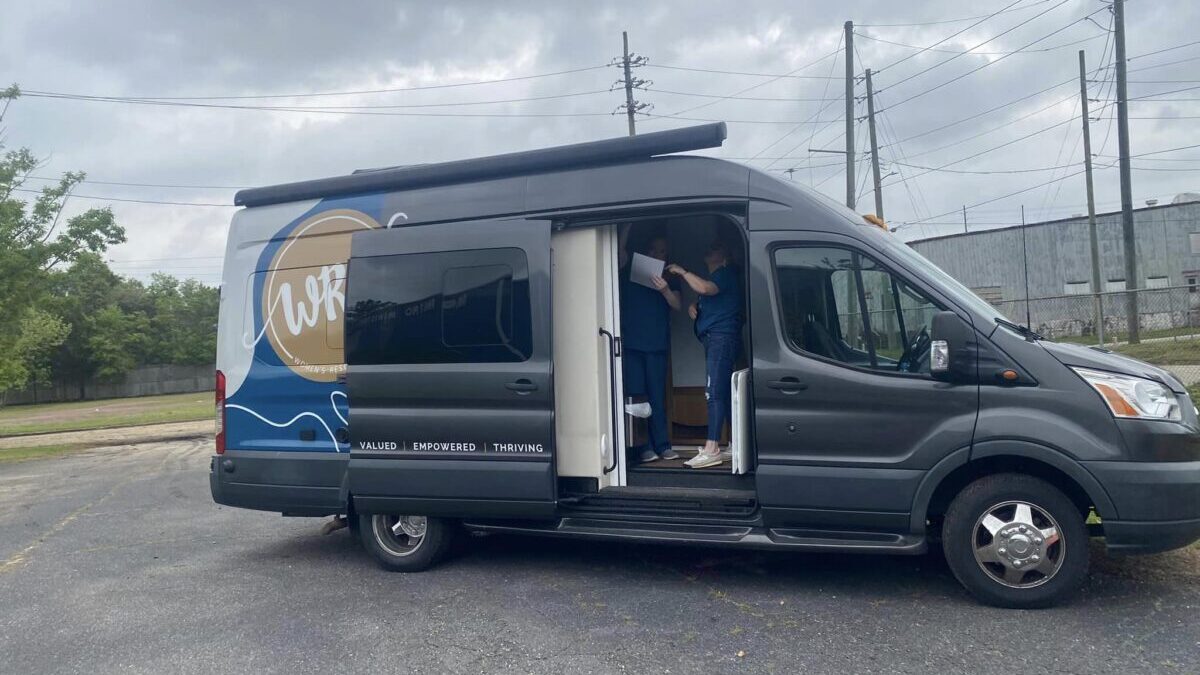When Marty Carrell became CEO of Women’s Resource Center in Mobile five years ago, she had heard many people describe the center’s work this way — they do pregnancy tests, and they’re against abortion.
And that synopsis didn’t sit well with Carrell.
“That is not who we are at all,” she said. “Yes, we do those things, but it is more about what we are for, and we are for life.”
For Carrell, that mission starts at the root — helping teenagers in Mobile live healthy lives and avoid situations where they might be weighing how to handle an unplanned pregnancy.
Since 2018, WRC has run a five-week-long, school-based program called Empower 2 Thrive, an expanded version of a school program started by the center in 2008.
The program is currently in eight public and private Mobile County middle and high schools.
‘Value, purpose, potential’
“We worked hard to find a curriculum that wasn’t just, ‘Do this; don’t do this,’” Carrell said. “It’s about building healthy relationships and knowing who you are, showing the students that they have value, purpose and potential.”
Working within the bounds of Alabama public education guidelines, presenters teach students how to set goals for their lives, and they talk about useful tools like personality types and love languages.
“We want to teach them about themselves — they can’t have a healthy relationship with someone else without knowing who they are,” Carrell said.
Presenters talk about the effects of technology, abuse, consent, how to break up with someone and other topics relevant to students today, she said. “It’s really interactive, and the students love us being there.”
Carrell said she and other presenters hope the students will decide to make healthy lifestyle choices.
“Prevention is the most pro-life thing we can do,” she said. “If we can prevent someone from even having to consider what they’re going to do about a pregnancy, we’ve done the best thing.”
Intervention and empowerment
Deanna Montieth, WRC clinic director, said two male students recently came to the clinic for a sexually transmitted infection test because of the information they learned through the class.
Visits like that start them on a path to be able to get more life help from WRC, which focuses on two other pillars after prevention — intervention and empowerment.
The intervention stage can include STI tests, pregnancy tests or ultrasounds. It also includes talking through pregnancy options with expectant mothers and doing risk assessments to reduce infant mortality for those mothers who choose to keep their babies.
In the empowerment stage, WRC offers parenting classes, post-abortive care and counseling for post-partum depression and other mental health concerns.
“It’s more than about just testing and treatment, it’s about being able to speak into their lives — body, soul and spirit,” Montieth said.
With pregnant women, for instance, she said it’s “not just that they change their mind but that it’s a healthy mom, healthy baby and healthy outcome.”
For nearly 40 years, WRC has been growing in how to accomplish that. They have two sites — one on Downtowner Boulevard in Mobile across from Planned Parenthood and one in Semmes — with a third in Saraland opening soon.
Local, national support
An ultrasound for the new site was provided by a grant from the Southern Baptist Ethics & Religious Liberty Commission.
And WRC has a mobile unit that they use as a fourth site — a van donated in September 2022 by Cottage Hill Baptist Church, where Carrell and Montieth are both members.
“We couldn’t do what we do without the local church, and Baptist churches in Mobile have played a tremendous role in the everyday mission of life at the WRC,” Carrell said.
In 2022, WRC gave nearly 1,700 pregnancy tests and saw 1,069 women change their minds about abortion and decide to deliver their baby.
They also saw more than 2,400 people come through their Empowered Parent Program, which averages 130–150 women per week in person, with additional women attending online.
Ninety-four people made decisions to follow Christ last year.
“We’re amazed all the time,” Carrell said. “We don’t force that or anything, but it’s a missions field, and we don’t have to go out looking for them, they’re coming to us.
“We’re really led by the Holy Spirit on that, and I emphasize a lot to the staff, ‘Your mission is to go in there and love people with the love of Jesus.’”




Share with others: